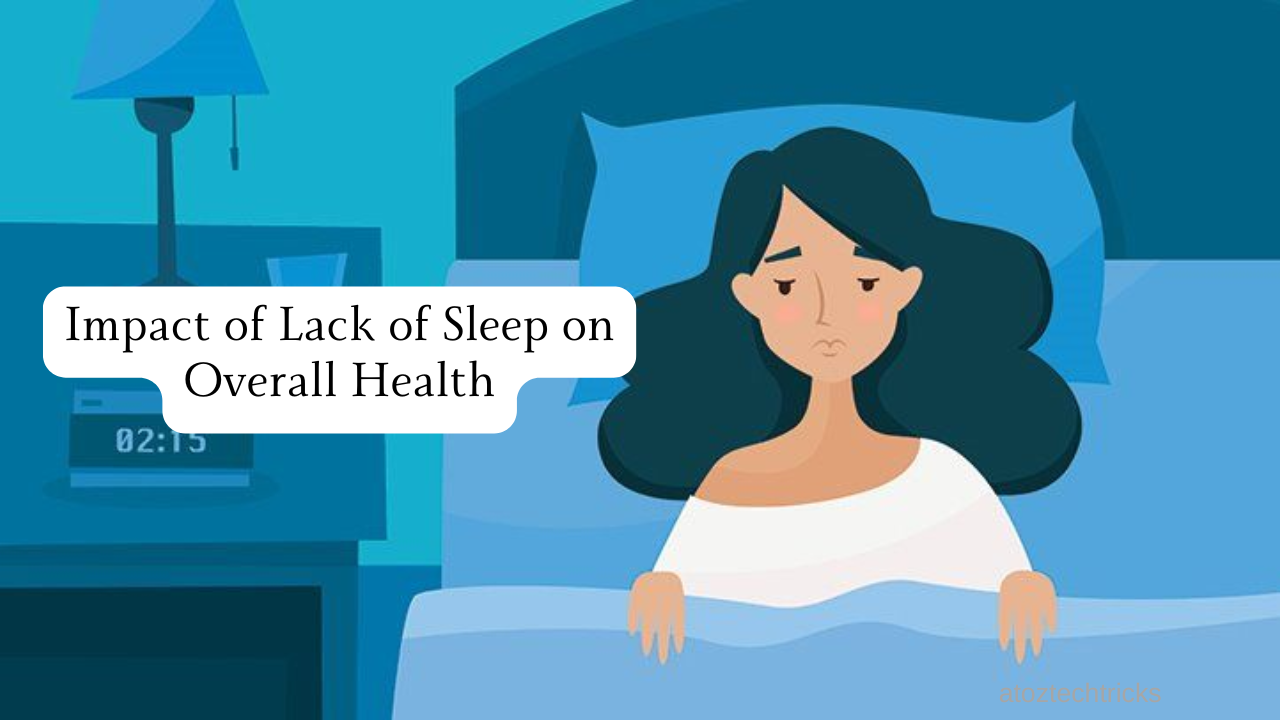The Impact of Lack of Sleep on Overall Health
In our fast-paced world, sleep often takes a backseat to work, social engagements, and entertainment. However, the consequences of chronic sleep deprivation can be severe, affecting almost every aspect of our health and well-being. Understanding the impact of lack of sleep is crucial for making informed lifestyle choices and prioritizing rest in our daily routines. This article explores how insufficient sleep influences physical health, mental well-being, cognitive function, and overall quality of life.
The Importance of Sleep
Sleep is a fundamental biological process that serves numerous vital functions. During sleep, the body repairs tissues, consolidates memories, and regulates various physiological processes. According to the National Sleep Foundation, adults generally need 7-9 hours of sleep per night to function optimally. However, many people fall short of this requirement, leading to significant health repercussions.
Physical Health Consequences
Cardiovascular Health
Lack of sleep has been strongly linked to cardiovascular issues. Chronic sleep deprivation can lead to high blood pressure, increased heart rate, and higher levels of inflammation in the body, all of which contribute to cardiovascular diseases. Studies have shown that people who consistently get less than six hours of sleep per night are at a higher risk of developing hypertension, heart disease, and stroke. The mechanisms behind these effects involve hormonal imbalances and increased sympathetic nervous system activity, which together strain the cardiovascular system.
Weight Gain and Obesity
Sleep deprivation can disrupt the balance of hunger-related hormones, leading to increased appetite and cravings for high-calorie foods. Ghrelin, a hormone that stimulates appetite, tends to increase when we don’t get enough sleep, while leptin, which signals satiety, decreases. This hormonal imbalance can contribute to weight gain and obesity, which are associated with a host of other health problems, including diabetes, hypertension, and certain types of cancer.
Immune System Function
A well-functioning immune system is crucial for defending the body against infections and diseases. Chronic sleep deprivation impairs immune function, making individuals more susceptible to illnesses such as colds and flu. Studies have demonstrated that people who sleep less than seven hours per night have a weakened immune response and are less capable of fighting off pathogens. The relationship between sleep and immunity is bidirectional; while poor sleep impairs immune function, a compromised immune system can also lead to further sleep disturbances.
Mental Health Effects
Depression and Anxiety
The link between sleep and mental health is profound. Lack of sleep has been identified as both a cause and a consequence of mental health disorders such as depression and anxiety. Chronic sleep deprivation can alter brain function, affecting mood regulation and increasing susceptibility to emotional disturbances. Additionally, poor sleep quality can exacerbate existing mental health issues, creating a vicious cycle of sleep problems and emotional distress. Research has shown that improving sleep can lead to significant reductions in symptoms of depression and anxiety.
Cognitive Impairment
Sleep is essential for cognitive processes such as attention, memory, and decision-making. Insufficient sleep impairs cognitive function, leading to difficulties in concentration, problem-solving, and memory recall. This impairment can have serious consequences for daily functioning, work performance, and overall quality of life. For example, sleep-deprived individuals are more likely to make errors, have slower reaction times, and experience reduced creativity. The negative impact on cognitive function highlights the importance of prioritizing adequate sleep for maintaining mental sharpness and productivity.
The Impact on Daily Life
Work and Productivity
Sleep deprivation can significantly affect work performance and productivity. Employees who are not well-rested are more likely to experience reduced efficiency, increased errors, and lower levels of job satisfaction. The economic impact of sleep-related productivity losses is substantial, with estimates suggesting billions of dollars in lost productivity annually. Organizations can benefit from promoting good sleep practices among employees and creating work environments that support adequate rest.
Safety and Accidents
Drowsiness can impair motor skills and reaction times, increasing the risk of accidents and injuries. Sleep-deprived individuals are more likely to experience accidents while driving, operating machinery, or performing tasks that require concentration and coordination. The National Highway Traffic Safety Administration (NHTSA) estimates that drowsy driving is responsible for a significant number of traffic accidents and fatalities each year. Ensuring adequate sleep is essential for maintaining safety and preventing accidents both on and off the road.
Social and Relationship Issues
Chronic sleep deprivation can strain relationships and affect social interactions. Irritability, mood swings, and reduced patience associated with lack of sleep can lead to conflicts and misunderstandings with family, friends, and colleagues. Additionally, sleep-deprived individuals may withdraw from social activities and have difficulty maintaining meaningful relationships. Addressing sleep issues can improve interpersonal dynamics and overall social well-being.

Strategies for Improving Sleep Quality
Establishing a Sleep Routine
One of the most effective ways to improve sleep quality is to establish a consistent sleep routine. Going to bed and waking up at the same time every day helps regulate the body’s internal clock and promotes better sleep patterns. Creating a relaxing bedtime routine, such as reading a book or taking a warm bath, can signal to the body that it’s time to wind down and prepare for sleep.
Creating a Sleep-Friendly Environment
The sleep environment plays a crucial role in determining sleep quality. Ensuring a comfortable mattress and pillows, maintaining a cool room temperature, and minimizing noise and light exposure can create an optimal sleep environment. Using blackout curtains, white noise machines, and other sleep aids can help enhance sleep conditions and promote restful sleep.
Managing Stress and Anxiety
Stress and anxiety are common contributors to sleep disturbances. Implementing stress-management techniques, such as mindfulness meditation, deep breathing exercises, and regular physical activity, can help reduce anxiety and promote better sleep. Finding healthy ways to manage stress and address underlying concerns can improve overall sleep quality and mental well-being.
Limiting Stimulants and Disruptors
Certain substances and behaviours can interfere with sleep quality. Caffeine, nicotine, and alcohol are known to disrupt sleep patterns and reduce sleep quality. Avoiding these substances, especially in the hours leading up to bedtime, can help promote better sleep. Additionally, limiting screen time and exposure to blue light from electronic devices before bed can help regulate the body’s sleep-wake cycle.
Seeking Professional Help
In cases where sleep issues persist despite implementing lifestyle changes, it may be necessary to seek professional help. Sleep disorders, such as insomnia, sleep apnea, and restless leg syndrome, may require specialized treatment and intervention. Consulting with a healthcare provider or sleep specialist can help identify and address underlying sleep disorders and develop a personalized treatment plan.

The impact of lack of sleep on overall health is profound and multifaceted. From physical health issues such as cardiovascular disease and weight gain to mental health concerns like depression and cognitive impairment, inadequate sleep affects nearly every aspect of our well-being. By understanding the consequences of sleep deprivation and implementing strategies to improve sleep quality, individuals can enhance their health, productivity, and overall quality of life. Prioritizing sleep is essential for maintaining optimal health and achieving a balanced and fulfilling life.




Post Comment